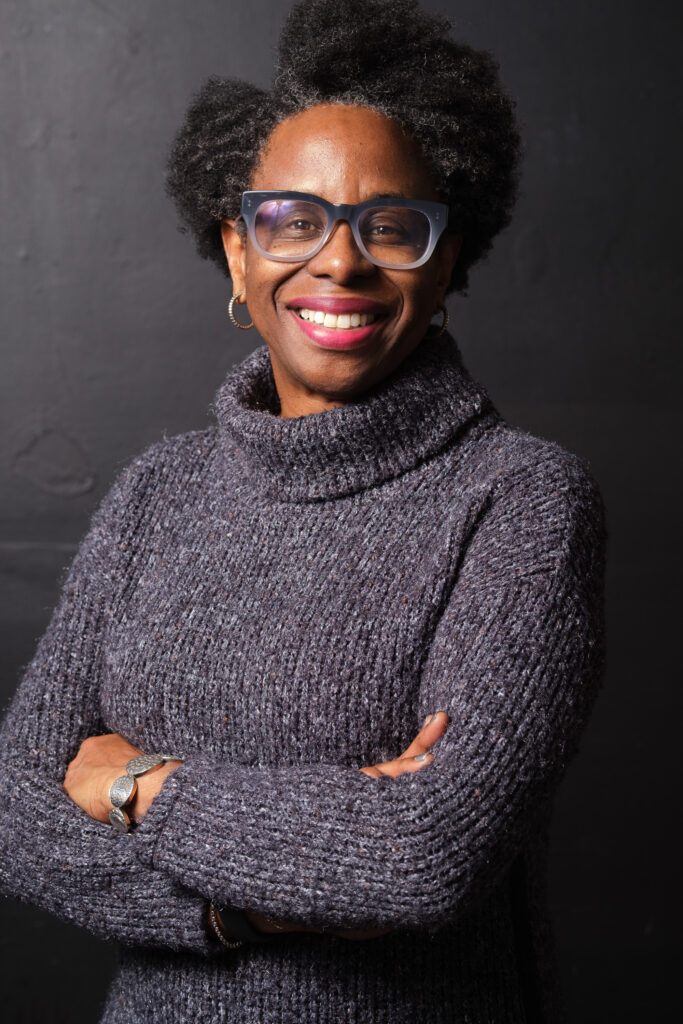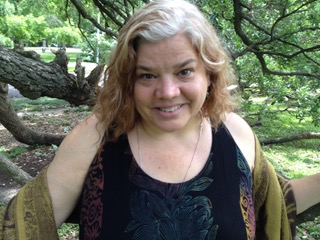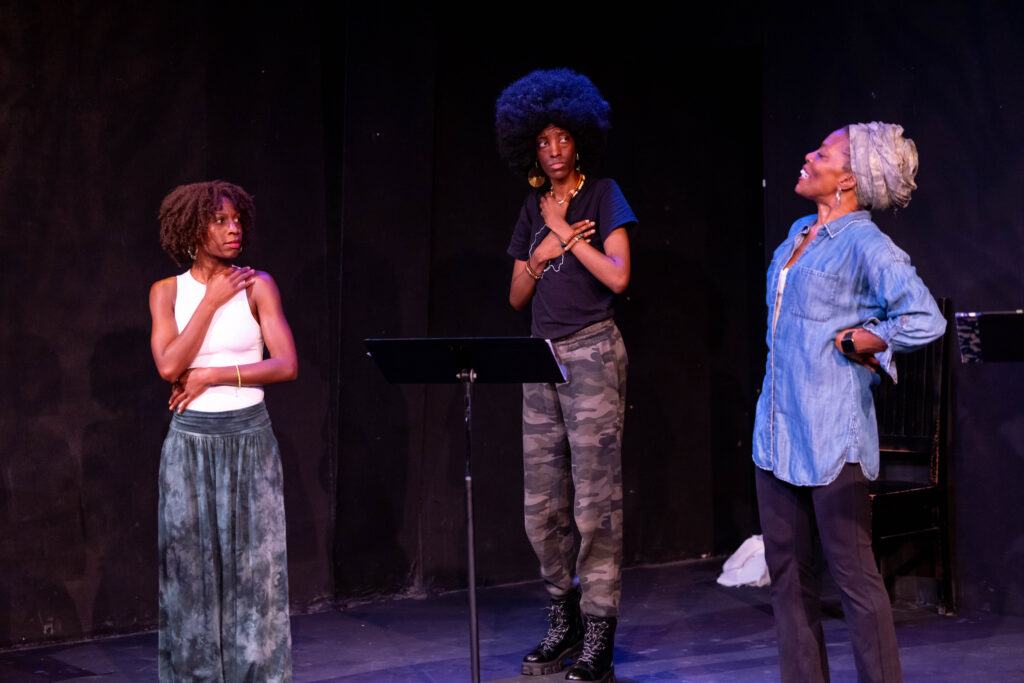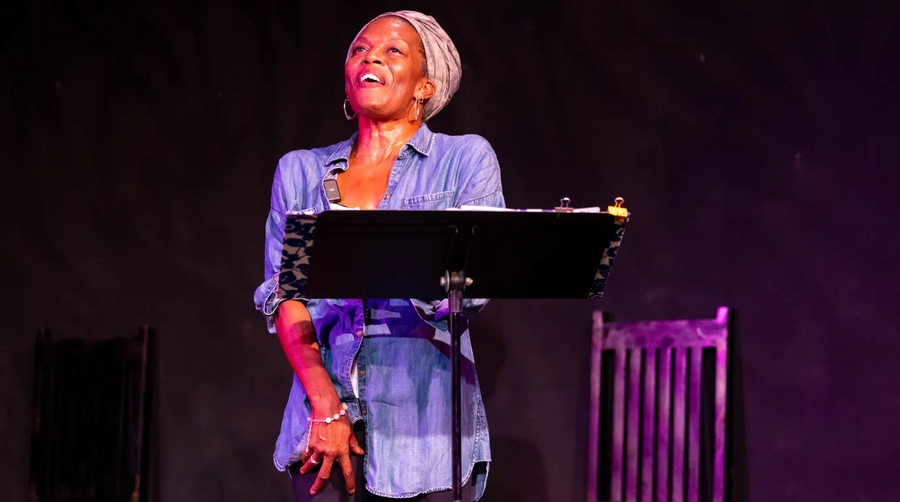Lisa B. Thompson knows intimately what it means to live in two worlds. Now the award-winning playwright of Single Black Female, also a professor of Performance as Public Practice as well as African and African Diaspora Studies at the University of Texas at Austin, is back with an audaciously constructed new play, deeply layered with intersectional cultural significance, The Black Feminist Guide to the Human Body, running at Austin’s Vortex Theatre April 12-May 4.
In a society with taboos about discussing the realities of aging, Thompson’s production is about taking good care of the changing body, and urges us to honor all of our pieces, even the broken ones. In the show, Black studies professor Beatrice “Bea” Free confronts her past and the parts of herself she wants to ignore as she drafts a paper titled “The Black Feminist Guide to the Human Body.” With guidance from her body (Cee Cee) and soul (Dee), Bea winds up writing a love letter to Black women and girls out of her memories, dreams, hopes and wonder. The result is equal parts spiritual mixtape, roadmap, us-help book, and collective diary of nursery rhymes, sacred stories, praise dances, and love songs.

As the playwright tells it, she was inspired to create the production after seeing the litany of women, particularly Black women academics, who have died prematurely. Last September, JoAnne A. Epps, acting president of Temple University, and Orinthia T. Montague, president of Volunteer State Community College, both died in the same week. Neither had made it to 75 years old.
“As I’m aging, I’m realizing that here are women who did all the right things and still ended up prematurely passing away,” Thompson said. “I wanted to pay homage to the people who put me in a very beautiful place as a scholar and an artist, as a mother. And also, to let people younger than me know that it happens very fast—first you’re the cool young professor, and then you’re not.”
Passionately advocating for healthy aging while confronting the alarming health disparities for Black women, The Black Feminist Guide to the Human Body encourages Black women to find joy and wisdom in aging rather than despair, and to support each other to intentionally aspire to the “softer life.” As Thompson put it, “We need to be resting and napping and not always grinding out here. And now I understand rituals of care in a different way, and I wanted to translate that.”
This choreopoem of original music, dance, and storytelling was commissioned by the National Performance Network, The Vortex, Fusebox Festival, the Lorraine Hansberry Theatre, and Pyramid Theatre. Each performance is an interactive theatrical experience, with audiences invited to use the show’s hashtag and post notes with advice, wisdom, and prayers with the characters to create different versions of the production.
To enhance the experience, wellness practitioners (doulas, massage therapists, yoga teachers, and medical experts) will participate in talkbacks and health fairs, and other wellness events will complement the show’s run from April 12 to May 4. (The first weekend is part of the Fusebox Festival of experimental new work in Austin.)
This kind of work has been the focus of Vortex co-founder and producing artistic director Bonnie Cullum since the theatre opened in Austin’s historically Black Six Square in 1988. Explaining the theatre’s mission, Cullum exuded pride: “We conjure urgent, unashamed art to create action in a shifting age. We embrace diverse communities, break down barriers, and elevate inclusive discourse from our cultural harbor in Austin, Texas.”

An experimental, alternative theatre company is not something you find every day, but over the years Cullum has found that risk has brought reward. “When we did more risk-taking, when we made work that was edge-walking, when we tried things artistically that were a little outside the box, we were always looking at what’s fresh, what’s new, what’s different—when we did those things, the audience responded,” Cullum said. “So I feel that I got confidence, because people came to see things that were more experimental.”
Thompson has had two other shows premiere at The Vortex: Underground in 2017, a political thriller that debates the best road to Black liberation; and The Mamalogues in 2019, a satirical comedy about the struggles of Black middle-class single moms to raise healthy Black children in a racist, sexist, anti-queer world. With Black Feminist Guide, Cullum said she sees Thompson finding her voice as an artist in a way she envisioned when she first started The Vortex.
“Lisa is creating a piece that is not only urgent, but very vulnerable and self-revelatory,” Cullum said. “All of these things are what I love in new work. I feel like Vortex has given it the incubator that it needed to grow and be ready to fly.”
A sense of home and room for experimentation has not only made The Vortex a brave space for Thompson’s work, but also for members of the show’s ensemble. One of the perennial performers in the Vortex family is Hayley Armstrong. As Dee (the soul), she’s the sassy alter-ego of multiple characters in Black Feminist Guide, as when she snaps at Bea and Cee Cee and proudly shouts, “Don’t let anyone tell you that you’re not a precious vessel!”
Armstrong, a seasoned voice actor, got her start at The Vortex when she was a 15-year-old participant in the free summer youth theatre program, which has been going strong since 1991. Now 31, she shares, “The Vortex gave me my wings. They gave me my confidence and after high school I auditioned for plays and I was cast every year after that. And I have not left The Vortex. I love them—love everything about them.”
Sadé M. Jones, a Duke University candidate for the MFA in Dance as an Embodied Interdisciplinary Praxis, plays Cee Cee (the body) in the ensemble and also serves as the production’s movement director. Jones said that the movement for the piece, which represents the arc of Bea’s journey, is influenced not only by theatremaking and contemporary culture but also the healing arts.

Musical accompaniment is inspired by Africa and the African diaspora—jazz, soul, and beyond—and includes three original songs co-written by Thompson and fellow artist/scholar Guthrie R. Ramsey Jr. and his Musiquology Media Group.
Nadine Mozon, performing as Dr. Beatrice “Bea” Free, is also an academic in real life who teaches acting and movement at Texas State University. Mozon marvels at the purpose-driven intentionality of Black Feminist Guide, commenting, “There are wonderful explorations and liberties the playwright has taken with the theatrical conventions and with the music and movement. It allows it to be many things. It’s not one long, linear conventional structure.”
As for Thompson, she considers herself a philosophical daughter of Valerie Smith, current president of Swarthmore College, and of artist/scholars Shirley Jo Finney, Ntozake Shange, and Anna Deavere Smith. She is glad that her work provides a way for fellow Black feminist artists to express themselves, pointing out, “Black women have to navigate the world and different institutions very differently than white women,” while also noting that her work appeals to a universal audience of women and men.
Navigating their way together is at the core of the partnership between The Vortex and The Black Feminist Guide to the Human Body. For Cullum, it affirms her belief in the power of theatre to “shift the culture in transformative ways” and in her pursuit of “risk, love, and excellence” in the craft.
Ramona Harper (she/her) is a theatre and dance critic currently based in Dallas. She was formerly a staff writer for DC Theater Arts in Washington, D.C. Follow Ramona on Onstagentx.com.


